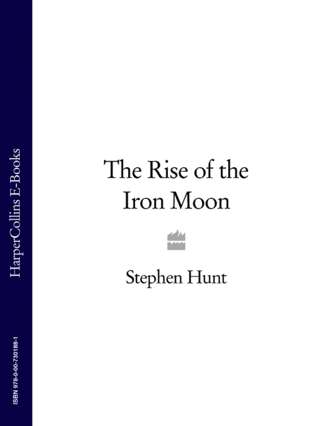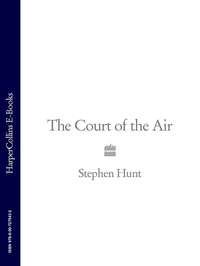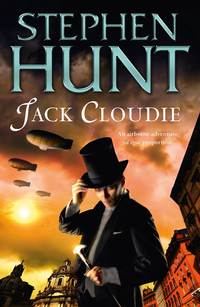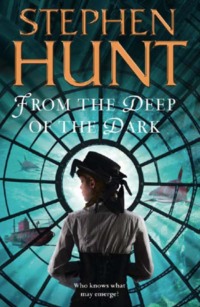
Полная версия
The Rise of the Iron Moon
So many voices in his mind. Too many voices. Kyorin rubbed his head frantically. ‘I just wanted to learn to swim.’
‘I can swim,’ the vagrant called out from further down the alley.
Kyorin had to focus. Two days of adrenaline-fuelled near escapes, low on sleep, nearly out of counterfeit currency to exchange for fruit from the sellers who wandered the streets of the capital with their trays. He pulled out the book from his pocket, the pages still damp from his escape down the River Gambleflowers. Velocities and Trajectories of Science by Timlar Preston. It had originally been written in Quatérshiftian, then translated into Jackelian; not that the language it was written in would have mattered to Kyorin. There was enough detail in the book that he could model the mind of the individual who had written it, feel its uniqueness. Resting his palm on the pages, he reached out.
Far above in the holding spheres of the Court of the Air, Kyorin sensed one of the cells of the aerial city filled with a screech of recognition, the noise muffled from the warders patrolling outside by riveted armour and pulsing curse walls.
Kyorin was burning up, running a fever from too much time exposed to the near constant drizzle of the Kingdom of Jackals’ capital city.
said Timlar Preston.
Kyorin received an image of the Quatérshiftian prisoner brandishing his pencil like a sword, ready to sketch out the few missing pieces of the mechanics he needed for his device.
Kyorin listened and began to fill in the gaps. Thank the stars it was he who had survived the masters’ hunters, rather than his ignorant desert-born friend swept away by the river. Half an hour later Kyorin was finished, the voice of the man held captive by the Court of the Air fading as the power of Kyorin’s weakened body began to wane.
sobbed Preston.
Far above, Kyorin sensed the Quatérshiftian prisoner finally lying down exhausted on his bunk, left to wonder if the voice in his head was indeed his madness snapped free.
Kyorin rested the book down by his side and glanced miserably towards the strip of sky above the alley. He couldn’t see the Court of the Air from the ground, so high was the aerial city’s station. Wrapped in clouds generated by its steam-driven transaction engines as they modelled the ebb and flow of Jackelian society, in as perfect a simulation as such primitive technology allowed. ‘I’ll get you out, my new friend. I must, or we are all dead.’
The chequerboard hull of a Royal Aerostatical Navy airship went past, a brief thrum from its engine and then it was gone. For a moment, Kyorin thought its shadow had remained, but it was the shadow of the vagrant looming large above him.
‘I’ll trade you.’
‘Trade me what?’ asked Kyorin.
The vagrant pulled out a book from his own jacket pocket, in a better state than the clothes from which it had emerged. ‘Lifted this from the stationer’s stall at the Guardian Fairfax atmospheric. Finished it now.’ He pointed at Kyorin’s damp book. ‘You finished with that?’
‘Yes,’ sighed Kyorin. ‘I believe I have.’
Kyorin received the book from the vagrant and passed up his own. A sudden suspicion struck him as he saw how the vagrant was looking at the cover of his new book. ‘You can’t read, can you?’
‘No, squire. But there’s plenty on the streets around here that can, and they read them for me – Old Man Pew, Barking Billy. The words don’t make sense to my eyes, see. Got the reading sickness.’ The vagrant sipped another swig from his upland firewater. ‘This book any good?’
‘It’s a philosophical treatise on velocity science and its practical applications as related to gunnery and celestial mechanics. Royal Society Press edition as translated from the original Quatérshiftian.’
Belching, the vagrant felt the smog-damp wall of the alley for support. ‘Sweet as a nut.’
Kyorin glanced down at the cover of his new book. The Moon Pirates of Trell by Molly Templar. There was a lurid illustration on the front: three explorers in pith helmets clutching lethal-force weapons as they stepped out of a crashed high-altitude airship onto a desert-like moon. Now this was really very promising.
In the road outside the alley a hansom cab had collided with a brewer’s wagon and an argument was about to boil over into violence. The crushers would be here any minute. Time to be off before the first police arrived.
As Kyorin walked past the vagrant he quickly stooped down and laid his palm flat on the man’s forehead. The vagrant yelled at the terrible flare of burning in his skull as his brain reworked itself into a new pattern.
‘Ask Old Man Pew to teach you to read,’ said Kyorin. ‘I don’t think you’ll have problems interpreting written words any more.’
Groaning, the vagrant reached for his bottle, trying to gulp the pain away. With an obscene gargle he spat the whisky down onto the mud.
Kyorin smiled, disappearing into the labyrinth of the rookeries. ‘Unfortunately, intoxicants will no longer taste quite as appealing as they did to you before your healing.’
There was a Pentshire moon outside the farmer’s window. Round. Full. Easily enough light for the farmer to see by as the squire’s thug took his hand and raised it slowly up in front of his face.
‘Now, imagine your fingers are voters,’ said the thug. He gave the farmer’s fingers a little wiggle.
‘Pay attention!’ hissed one of the other two men pinning down the farmer’s body. ‘This is important.’
‘Nice, fat, plump little voters. Contented,’ explained the ringleader. ‘They know who to vote for. They know who owns the tenancy on their farms and crofts. But—’ his voice turned ugly ‘—now someone else comes along to stand for parliament, and look, they’re all confused.’ He wiggled the farmer’s fingers in a sad little dance.
‘Someone who’s not been paid off to throw the election for you in your rotten little borough,’ spat the farmer, spots of blood from his smashed face landing on his bedroom floor as he spoke.
‘That’s a terrible accusation to make,’ said the ringleader. ‘You see, when the voters are confused, they just need straightening out.’
The ringleader took one of the farmer’s fingers and pushed it back, the snap of bone nearly making him faint.
‘That’s a lot of work for us,’ observed one of the thugs behind him, hissing the words into his ear. ‘And the Circle knows, you’ve kept us busy enough this year already, organizing every labourer whose ear you could grab to pour your poison into their thick heads, setting up a damn tenants’ union.’
Another finger snapped and the farmer desperately tried to stop himself screaming so he didn’t wake up the others in the farmhouse, trying to keep his family out of this.
‘And you wouldn’t like parliament,’ added the second of the thugs behind him. ‘All those long airship trips down to Middlesteel, and the prices in the capital are diabolical.’
A third finger snapped and all the farmer could think of was how he was going to walk the shirehorse and the plough across his fields next week in this mangled state.
‘Don’t get me wrong, now,’ continued the ringleader, ‘but I just can’t see you sitting in the House of Guardians. They’re carriage folk, mostly, and there’s you with no carriage at all – why, I wager you wouldn’t even know which spoon to pick up from the table to use for your soup. You would just embarrass us all if you got elected.’
The ringleader made to break the farmer’s last finger, but then shook his head as if changing his mind. ‘And here’s something I bet you haven’t considered. If you’re down in Middlesteel, hobnobbing with all the quality and listening to all those boring bills being read in parliament, then who’s going to be looking after your family?’
The farmer’s heart leapt. Even they wouldn’t? A fourth thug emerged into the room with the farmer’s son struggling in his grip, one hand covering the boy’s mouth, the other clutching a pheasant-skinning knife.
‘Please!’ the farmer begged.
‘What, you thought we were joking?’ said the ringleader. ‘Thought we’d come a-visiting your home at night for a bit of sport, did you?’
‘Please!’
The shadows in the room were growing longer, thicker. Like mist. But no one noticed. The farmer was struggling desperately under the weight of the thugs holding him down, the others were too giddy with the excitement of the kill.
‘Shut up, you’ve got another two lads, you’re not even going to miss one of them.’
‘You can’t do this!’
‘I feel your pain,’ laughed the ringleader.
‘And I feel your evil,’ hissed another voice, as the thug holding the farmer’s son stumbled back into the shadows of the room. They were both enveloped and disappeared, a second before the grip holding the farmer fast seemed to slip away and he was free.
The farmer backed away as the ringleader and the remaining thug glanced hastily around at the shadows of the room, hundreds of them, swelling and moving like the surf on the sea. Solid. Black. Laughter seemed to bubble out of those shadows, but there was no happiness in it. It was a pit to hell opened in that room, the echo of a fallen soul rising out of the depths. But where was his lad, and where was the thug who had been holding him?
Twisting a knife around in his hand, the ringleader seemed to be trying to locate the sound of the terrible laughter. There was an explosion of light from one corner, blinding the farmer, then a series of wet slaps. As the dots cleared from the farmer’s eyes, he realized the only other person left in the room was the ringleader, the shadows twisting and circling around him.
‘You’ve carried your squire’s message for him this night,’ laughed a dark voice. ‘I have one for you to take back to him.’
There was a snap-snap-snap of light – like the powder flash on a camera – the shadows and the light merging to become an angular figure striking at the gang’s ringleader. The farmer turned his head to avoid the shower of splintering glass as the thug was forced to leave by the window.
The room seemed to return to normal, the intense light diminishing to a sparkle on the handle of a pistol – one of a pair – holstered on a figure wearing a jet-black riding coat, his face covered with a dark executioner’s hood.
‘My son?’ trembled the farmer, looking mesmerized at the three corpses lying on the floor of his bedroom.
‘Back in his room,’ said the figure. ‘A child’s mind is a very flexible thing. He’ll remember nothing of this night.’
‘Dear Circle,’ said the farmer, ‘what have you done, man? There’s three dead here. The squire has the county constabulary in his pocket, they’ll—’
‘The county magistrate is due a visit from me, as, I believe, is the squire.’
‘You can’t interfere with justice!’
The terrible laughter returned to the room. ‘They only know about the law; I shall explain what justice is.’
‘You’re him, aren’t you. The one they talk about.’
‘Look out of the window,’ said the hooded figure. ‘What do you see?’
The farmer stood in front of his shattered window. There was the gang’s ringleader, crawling across the glass on a broken leg, moaning, trying to reach his horse. And a dense fog was forming – seeping out of the woods, fingers of it probing along the ground like the legs of a curious spider. It was a marsh fog. The farmer looked around, but the three corpses had disappeared.
Vanished too was the Hood-o’the-marsh. Only the broken window remained as evidence that the farmer hadn’t dreamt the whole break-in.
* * *
Walking into the woods, the Hood-o’the-marsh allowed himself a smile, shouts from the squire’s mansion echoing behind him as the great house’s retainers spilled into the night, waving their blunderbusses and birding rifles. Someone was yelling to douse the lanterns, more of a hindrance than help on a nighttime pursuit. Not that it would do them any good, any more than cavalry redcoats would be able to help the bloody figure of a county magistrate in a dressing gown, stumbling towards town and the garrison. He owned the night. Not much of a recompense for losing the ability to sleep, to dream.
Which was why the silhouette of the woman waiting at the top of the hill took him by surprise. Nobody could sneak up on him. Nobody. Not since he had found… both pistols were suddenly in his hands as he advanced, treading silently towards the woman. After all these years, could it really be her?
‘Mother, is that you?’
There was no answer. He could feel nothing from her, as if she had no weight on the world. No evil. No goodness either. And there was only one person – if you could call her a person – who had ever registered on the Hood’s senses like that.
‘Mother, if—’
‘I am not the Lady of the Lights,’ said the silhouette. ‘But perhaps you should recognize me anyway, Oliver Brooks?’
He moved closer. There was just enough moonlight to see that the silhouette was wearing what looked like leather armour covered by bronze chainmail – archaic, the very picture of a warrior maiden from the cheap woodcuts of a child’s novel.
‘Enough of this.’ Oliver pointed his two pistols at her but they vanished from his hands, reappearing in her own. The light reflecting from the pistols became twin suns, blinding him. As the light dwindled he saw that the pistols had changed form, one becoming a trident, the other an oblong shield with the crude face of a lion cast on it. The lion of Jackals.
Oliver gaped. ‘They’re mine.’
‘No,’ said the woman. ‘They are mine. As are you, Hood-o’the-marsh.’
‘You are an Observer then,’ said Oliver.
‘No, I’m not one of them,’ said the woman. ‘I’m a local girl. Did you never wonder where those two pistols of yours, so carefully passed down the ages from master to master, actually came from? It is my work you are about, Oliver Brooks.’
‘Is it, indeed?’ said Oliver. ‘Then return those two pistols and I’ll be about it once more.’
‘Time enough for that,’ said the woman. ‘There are more important matters to attend to than corrupt guardians and local magistrates. Have you not felt the wrongness in our land?’
Oliver gazed down at his empty hands. She knew that he had.
‘There is an ache in my bones,’ continued the woman, ‘and I fear what it augurs.’
‘Your bones?’
‘The bones of the land, Oliver Brooks of the race of man,’ said the woman. ‘The bones of the Kingdom of Jackals.’
‘Jackals is a country, not a person,’ said Oliver. ‘It’s my country.’
‘You are half-right,’ said the woman. ‘Jackals is an idea, a dream of freedom that is dreamt by all those who live in the forests and glades of this green land. That is why you can dream no longer, Hood-o’the-marsh. Your job is to protect those who do dream, those who still believe in me.’
‘Are you certain that you’re not an Observer?’ said Oliver. ‘You surely sound like one to my thick ears.’
‘I’m not one of the grand system’s angels, I have already told you that. I’m the god of details. I’m the rustle of the wind in the oaks, the splash of a stone rolling into a loch, the mountains that stood against the glaciers and the spirit that won’t be crushed.’
‘Why are you here?’ asked Oliver.
‘Do you not remember the tales of battle your uncle told you sitting around the fire grate of Seventy Star Hall?’ said the woman. ‘Of a time when Jackals would be threatened and of what would arise once again from a circle of ancient standing stones?’
‘He told me a lot of things about the war,’ said Oliver. And so his uncle had. The mud-drenched fields of the east, Jackelian troops in trenches, wiping the smoke of battle from their gas masks’ visors. The visions they sometimes saw in the sky, the product of chemical leakage through their suits or a by-product of the earthflow particles and mage-war. Lions running through the sky. Strange angels clashing in the heavens. ‘Are the first kings really about to return from their slumber? There’s no danger of war between Jackals and the Commonshare now. Quatérshift can barely feed its own people, let alone mount another invasion.’
‘No, the threat is not from the east this time.’
‘Where, then? Cassarabia? The regiments saw off the last bandit army that came up from the desert. The caliph fears the high fleet and the wrath of the Royal Aerostatical Navy too much to make a more direct intervention.’
‘There is an old saying in the Jackelian regiments,’ said the woman. ‘It is always the bullet you don’t see that gets you.’
‘I repeat my question: are the first kings about to return?’
‘Right idea,’ said the woman. ‘Wrong gender. You are the key, Oliver. You will need to reunite with the scheme of offence to defeat that which is coming.’
‘You mean Molly Templar?’ Oliver laughed. ‘You’re a little out of touch. Molly is a famous author now, her celestial fiction the toast of the publishing houses along Dock Street. If you want someone to fill five pages in a penny dreadful with a story of derring-do, then she’s definitely your woman. But this—’ Oliver gestured around the woods ‘—running around the night, getting shot at. I don’t think so. Not anymore.’
‘Her path is still bound to yours,’ said the woman. ‘I need both of you together again, though far more than the pair of you will be required for the conflict that is bearing down upon us. Even together, the two of you are not enough to defeat that which you will face …’
‘Yes, the enemy. I was hoping you could be a little less obscure on the nature of the enemy, given how you’re definitely not an Observer, but the goddess of details and all that.’
A fog was rising around the warrior woman’s body, a marsh mist. An hour ago Oliver would have said it was one of his mists, but now he knew better. The mist belonged to the land. It was the Kingdom of Jackals’.
‘You are the key, Oliver; you will know when the time comes. Remember, you wear my favours, young man. Wear them proudly.’
With a burst of light, the familiar, comforting weight of the two pistols was back in his hands. The mist had enveloped the warrior woman, returning her essence to the soil of their land.
CHAPTER TWO
Purity Drake bent down to pick up the empty brown beer bottle, recently rolled under the tall iron railings of the palace following a chance impact with one of the many pairs of shoes exiting from Guardian Fairfax atmospheric station – the gates to the underground transport system hidden just out of sight, but not so far away that the grit and soot from the vast stacks that kept the atmospherics’ tunnels under vacuum didn’t rain down on the palace grounds day and night. Endless supplies of soot that constantly needed sweeping from the flagstones in front of the palace’s faded marble façade.
But what shoes there were in the crowds outside. Polished knee boots the season’s fashion for the men; patterned red leather with shiny copper buckles and heel ribbons for the ladies. Shiny patent dress boots for the soldiers barracked in the capital, so swish under their cherry-red cavalry trousers. And big hobnailed affairs – toe-armoured for protection, cushion-heeled for comfort – for the workaday crushers patrolling the royal precinct. All serving only to remind Purity of the dirty naked feet at the other end of her grimy, stockingless legs. She wiggled her bare toes sadly, then stood up and dropped the empty bottle in her rubbish sack.
Purity’s mind drifted to the daydream – her favourite daydream. One day some young girl going to school, a rich mill-owner’s daughter, would notice a small hole in her perfect, fashionable shoes, and her mother would arch an immaculate eyebrow in disgust and pull the shoes off, leading her daughter at once to the nearest cobbler for a fresh pair. The discarded shoes would land near enough to the railing for Purity to reach out and lift, lift towards her, the beautiful pair of—
There was a loud, a meaningful cough. One of Purity’s two political police handlers had noticed she had stopped working. He nodded contemptuously towards the wire-haired brush – almost as tall as Purity after her sixteen years of the Royal Breeding House’s meagre diet. Gruel and bread, with meat served on Circleday only. She didn’t complain. Who would care to listen? Picking up the brush again, Purity quietly wiped the dirt off her drab grey shawl and went back to sweeping the flagstones. It was a mixed blessing, the duty of cleaning the palace grounds. It freed her from the captivity and tedium of the Royal Breeding House, true, and the exercise and fresh air were welcome. But this close to the main gates it would not take much for any bored passing republicans to notice the golden crown sewn onto her clothes. Republicans who would not mind that it wasn’t a stoning day and that Purity Drake wasn’t the queen. The types who would take it into their thick skulls that she made a perfect target for a bit of impromptu sport.
Purity glanced out of the railings towards the other side of the palace square. There had been a shoe shop in the line of merchants opposite at one point. Thank the Circle, that concern had shut down last year. Those bowed windows filled with tiered rows of boots and shoes stitched by the hands of a master cobbler had been so tantalizing – no cheap manufactory offcuts there.








